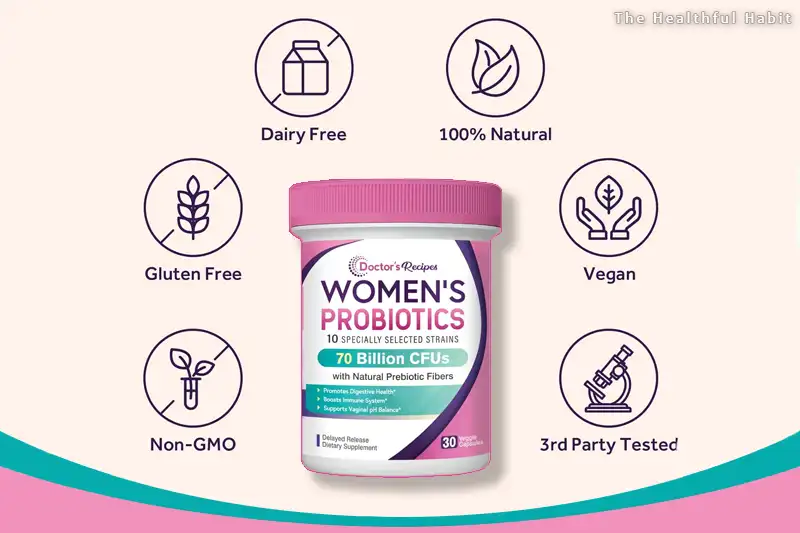Doctor's Recipes Probiotics for Women Review
Doctor's Recipes Probiotics for Women: A Complete Analysis of This 70 Billion CFU Formula
Women's health supplements have exploded in popularity, but finding a probiotic that truly delivers on its promises can feel overwhelming. With countless options claiming miraculous benefits, it's crucial to separate marketing hype from genuine science-backed formulations.
Today we're diving deep into Doctor's Recipes Probiotics for Women—a supplement that promises to support both digestive and vaginal health with its 70 billion CFU, 10-strain formula. But does this probiotic live up to its claims, or is it just another overhyped product in a crowded market?
After analyzing the ingredients, reviewing the latest research, and examining real-world applications, here's everything you need to know about whether this supplement deserves a spot in your wellness routine.
What Makes Doctor's Recipes Probiotics Different?
Doctor's Recipes positions itself as a women-specific probiotic, and there's actually solid reasoning behind this approach. The vaginal microbiota plays a crucial role in women's health from puberty to menopause, making targeted probiotic support increasingly important.
This formula contains 70 billion CFU (colony-forming units) across 10 carefully selected strains, including two powerhouse probiotics: Lactobacillus reuteri and L. acidophilus. What sets it apart is the inclusion of 150mg of organic prebiotics from Acacia Senegal and Jerusalem Artichoke Root—ingredients that actually feed the beneficial bacteria.
Key Features:
- 70 billion CFU potency
- 10 gynecologist-recommended strains
- Organic prebiotic blend
- Shelf-stable formula (no refrigeration needed)
- Delayed-release capsules
- Made in USA, GMP-certified facility
The Science Behind the Star Ingredients
Lactobacillus reuteri: The Multi-Tasker
Lactobacillus reuteri is a well-studied probiotic bacterium that can colonize a large number of mammals and is found in different body sites, including the gastrointestinal tract, urinary tract, skin, and breast milk. This versatile strain has shown particular promise for women's health applications.
Research indicates that Lactobacillus reuteri RC-14 are among the world's most documented probiotic strains for women's health, selected for their ability to interfere with infectivity of a range of bacteria and yeast in the vagina. This makes it a logical inclusion in any women-focused probiotic formula.
L. acidophilus: The pH Balancer
L. acidophilus is arguably one of the most researched probiotic strains, particularly for maintaining vaginal pH balance. It produces lactic acid, which helps create an environment that's hostile to harmful pathogens while supporting beneficial bacteria.
The Prebiotic Advantage
Including organic Acacia Senegal and Jerusalem Artichoke Root isn't just clever marketing—it's smart science. These prebiotics provide soluble fiber that feeds beneficial bacteria, potentially improving their survival and effectiveness once they reach your gut.
Real-World Benefits: What to Expect
Digestive Health Support
The formula targets common digestive concerns like gas, bloating, and irregular bowel movements. The 10-strain approach provides diversity, which research suggests may be more effective than single-strain formulas for overall gut health.
Vaginal Health Maintenance
This is where the formula aims to shine. The specific strains chosen have research backing their ability to support vaginal pH balance and healthy flora. However, it's important to note that unlike with the gut and digestion, there is almost no evidence for any benefit from probiotics for vaginal health, according to some medical experts.
"The relationship between oral probiotics and vaginal health is complex and still being researched. While some studies show promise, women should maintain realistic expectations and consult healthcare providers for specific concerns."
Pros and Cons: The Complete Picture
What We Love:
- High potency: 70 billion CFU provides substantial bacterial count
- Strain diversity: 10 different strains offer broader potential benefits
- Shelf stability: No refrigeration needed makes it travel-friendly
- Delayed release: Helps protect bacteria from stomach acid
- Organic prebiotics: Added fiber supports bacterial growth
- Clean formula: No soy, gluten, dairy, or GMOs
- Made in USA: GMP-certified facility ensures quality standards
Potential Drawbacks:
- Limited research: While individual strains are studied, this specific combination lacks clinical trials
- Vaginal health claims: Scientific consensus on oral probiotics for vaginal health remains mixed
- Price point: May be more expensive than basic probiotic formulas
- Individual variation: Results can vary significantly between users
- 30-day supply: Monthly purchasing required for consistent use
Who Should Consider This Probiotic?
Doctor's Recipes Probiotics for Women makes the most sense for:
Women experiencing digestive issues like bloating, gas, or irregular bowel movements who want a comprehensive approach to gut health.
Those seeking convenience in their supplement routine—the shelf-stable formula and once-daily dosing eliminate common barriers to consistency.
Women interested in preventive health who want to maintain their existing vaginal and digestive wellness rather than address active infections or serious conditions.
Travelers and busy professionals who need supplements that don't require special storage or complex dosing schedules.
What This Probiotic Won't Do
It's crucial to set realistic expectations. This supplement likely won't:
Cure active infections: Bacterial vaginosis, yeast infections, or UTIs require medical treatment, not just probiotic support.
Work overnight: Probiotic benefits typically take weeks to months of consistent use to become apparent.
Replace good hygiene: Proper intimate hygiene and safe practices remain essential for vaginal health.
Guarantee universal results: Individual microbiomes vary significantly, meaning what works for one person may not work for another.
Value Assessment: Is It Worth the Investment?
At approximately $30-40 per bottle (pricing varies), Doctor's Recipes Probiotics falls into the premium category. Here's how to evaluate if it's worth it:
Cost per billion CFU: With 70 billion CFU per capsule, the per-unit cost is competitive with other high-potency formulas.
Convenience factor: Shelf stability and once-daily dosing add value for busy lifestyles.
Quality indicators: GMP certification, organic ingredients, and strain selection suggest attention to quality.
However, remember that more expensive doesn't always mean more effective. Recent studies on vaginal probiotics show preliminary effectiveness, but results vary significantly between individuals.
Potential Side Effects and Precautions
Most women tolerate this probiotic well, but some may experience:
Initial digestive adjustment: Mild bloating, gas, or changes in bowel movements during the first week are common as your gut microbiome adjusts.
Rare allergic reactions: Although the formula is free from major allergens, individual sensitivities can still occur.
Important considerations:
- Pregnant or nursing women should consult healthcare providers before use
- Those with compromised immune systems need medical approval
- Active infections require medical treatment, not just probiotic support
How to Maximize Results
If you decide to try Doctor's Recipes Probiotics, here's how to get the best results:
Consistency is key: Take daily at the same time, preferably with food to reduce stomach upset.
Support with lifestyle: Maintain a balanced diet rich in fiber, stay hydrated, and limit excessive sugar intake.
Give it time: Allow 4-8 weeks of consistent use before evaluating effectiveness.
Track changes: Keep a simple log of digestive symptoms or changes to identify patterns.
Comparison with Alternatives
Doctor's Recipes competes with several established women's probiotic brands:
Garden of Life RAW Probiotics Women: Higher CFU count (85 billion) but requires refrigeration
Culturelle Women's Healthy Balance: Single strain (L. rhamnosus) but extensively researched
Renew Life Women's Care: Similar multi-strain approach but different prebiotic blend
The choice often comes down to personal preferences regarding strain selection, convenience factors, and budget considerations.
The Bottom Line: Should You Try It?
Doctor's Recipes Probiotics for Women represents a thoughtfully formulated supplement that addresses real concerns many women face. The combination of research-backed strains, organic prebiotics, and convenient shelf stability makes it a solid choice for those seeking comprehensive probiotic support.
However, it's important to approach this—or any probiotic—with realistic expectations. Probiotics show some promise in keeping the vaginal microbiome in balance, but more research is needed to confirm this.
The formula is most likely to benefit women looking for digestive support with potential vaginal health benefits as a secondary goal. If you're dealing with active infections or serious health concerns, consult with a healthcare provider before relying on probiotics alone.
For the investment, you're getting a quality product with attention to ingredient sourcing and manufacturing standards. While not miraculous, it offers a science-based approach to supporting women's microbiome health.
Remember: the best probiotic is one you'll take consistently. If Doctor's Recipes' convenience and formulation fit your lifestyle, it could be a valuable addition to your wellness routine.
Frequently Asked Questions
How long before I see results from this probiotic?
Most users report initial digestive improvements within 1-2 weeks, with more significant benefits appearing after 4-8 weeks of consistent use. Individual results vary based on your starting microbiome and overall health.
Can I take this probiotic with antibiotics?
Yes, but timing matters. Take the probiotic at least 2 hours before or after antibiotic doses to prevent interference. Continue the probiotic for several weeks after completing antibiotics to help restore gut flora.
Is this safe during pregnancy or breastfeeding?
While the strains are generally considered safe, pregnant and nursing women should consult their healthcare provider before starting any new supplement, including probiotics.
Why doesn't this probiotic need refrigeration?
The formula uses shelf-stable strains and protective packaging that maintains bacterial viability at room temperature. However, avoid storing in hot, humid conditions like bathrooms or cars.
Can men take this "women's" probiotic?
While marketed for women, men could benefit from the digestive support aspects. However, men might prefer a general probiotic formula without the specific vaginal health focus.
What if I experience digestive upset when starting?
Mild bloating or gas during the first week is normal as your microbiome adjusts. Start with every other day if needed, then gradually increase to daily use. Persistent severe symptoms warrant discontinuation and medical consultation.
Do I need to take this with food?
While not strictly necessary due to the delayed-release capsules, taking with food may reduce any potential stomach upset and can improve bacterial survival.
How does this compare to yogurt for probiotic benefits?
Supplements provide higher, more consistent bacterial counts and specific strains. Yogurt offers additional nutrients but typically contains fewer bacterial varieties and lower potency.
Can I open the capsules if I have trouble swallowing pills?
Opening capsules defeats the delayed-release mechanism, potentially reducing effectiveness. Consider looking for powder or chewable probiotic alternatives if pill-swallowing is difficult.
What should I do if I miss a dose?
Simply take your next dose as scheduled—don't double up. Consistency matters more than perfection, so resume your regular routine without worry about occasional missed doses.
Legal Disclaimer: The information provided in this article by The Healthful Habit is for educational and informational purposes only. It is not intended to replace professional medical advice, diagnosis, or treatment. Always seek the guidance of your physician or another qualified healthcare professional before starting any new diet, supplementation, or exercise program, especially if you have a preexisting medical condition. The author and The Healthful Habit website do not assume responsibility for any actions taken based on the information presented in this blog. Individual results may vary, and what works for one person may not work for another.
We are participants in the Amazon Services LLC Associates Program, an affiliate program that allows us to earn commissions by recommending products to Amazon.com in some articles.




